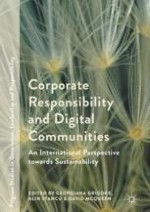2018 | OriginalPaper | Buchkapitel
11. The Role of CSR Communication in Master’s Degree Curricula Throughout Europe: Universities’ Roles as Digital Communities in Preparing Students for Future Challenges
verfasst von : Isabell Koinig, Franzisca Weder, Sandra Diehl, Matthias Karmasin
Erschienen in: Corporate Responsibility and Digital Communities
Aktivieren Sie unsere intelligente Suche, um passende Fachinhalte oder Patente zu finden.
Wählen Sie Textabschnitte aus um mit Künstlicher Intelligenz passenden Patente zu finden. powered by
Markieren Sie Textabschnitte, um KI-gestützt weitere passende Inhalte zu finden. powered by
